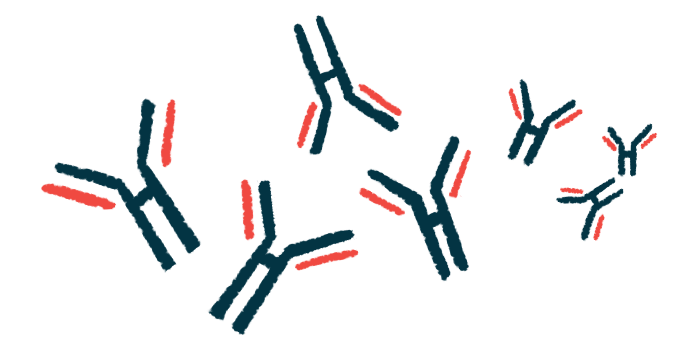Sanofi’s SAR445088 possible successor to Enjaymo
Experimental treatment for CAD shows promise in preclinical research

Sanofi’s experimental therapy SAR445088 effectively blocks the classic complement pathway — a part of the immune system that’s implicated in cold agglutinin disease (CAD) — and reduced red blood cell destruction in a cellular model of CAD, a study showed.
SAR445088’s more targeted action may make it a successor to Sanofi’s Enjaymo (sutimlimab-jome), an approved CAD treatment that also suppresses the classic complement pathway.
The next-generation therapy is currently being tested in adults with CAD in a Europe-based Phase 1 clinical trial (NCT04802057).
The study, “Anti-C1s humanized monoclonal antibody SAR445088: A classical pathway complement inhibitor specific for the active form of C1s,” was published in the journal Clinical Immunology.
CAD is caused by a specific type of self-reactive antibodies called cold agglutinins that attack and destroy red blood cells at low temperatures. The immune complement cascade, particularly its classical pathway, is involved in this process.
Enjaymo, treatment for CAD, approved last year
Enjaymo, which was approved last year as a CAD treatment, is an antibody-based therapy that selectively blocks the activity of complement component 1s (C1s), which is responsible for initiating the classical complement cascade.
The therapy — administered once weekly for the first two weeks, and every other week thereafter — was shown to significantly reduce red blood cell destruction and symptoms of CAD.
As a potential Enjaymo successor, Sanofi developed SAR445088, an antibody-based therapy that specifically binds to and blocks the active form of C1s, leaving its inactive form, found at much higher levels, untouched.
This means that less of the therapy is wasted on non-targets, and that its pharmacokinetics (movement through, in, and out of the body) is improved.
“In turn, this may lower the dose and/or reduce the dosing frequency required for SAR445088,” the researchers wrote.
SAR445088 is a humanized version of TNT005, a mouse antibody that targets the active form of human C1s. A humanized antibody results from the modification of the original protein sequence to increase its similarity to a human antibody, allowing its use by people.
Comparing SAR445088 and TNT005
Now, researchers at Sanofi conducted laboratory experiments comparing the properties of SAR445088 with those of TNT005 to ensure that the former’s humanization process had not altered its complement-blocking properties.
They found that SAR445088 demonstrated high selectivity for active C1s and that it binds to C1s with a similar strength to its parental antibody TNT005.
Both antibodies were shown to be potent and selective suppressors of the classic complement pathway, leaving other complement pathways unchanged. Also, they both reduced classic complement-mediated destruction of red blood cells in sheep.
The researchers then conducted tests on a cellular model of CAD that uses blood from people with the disease. Instead of SAR445088, they used another of its precursors, TNT010, that differs only by two amino acids (protein’s building blocks) and shares the same C1s-binding region.
As such, “use of TNT010 is considered equivalent to SAR445088,” the team wrote.
Results showed that TNT010 was able to effectively suppress the deposition of C3b in healthy red blood cells exposed to blood from CAD patients, as well as C3b-mediated red blood cell phagocytosis.
Red blood cell phagocytosis is a process in which these cells are engulfed, or eaten, by certain immune cells in the spleen and liver and that has been shown to contribute to red blood cell destruction in CAD.
Animal studies needed
These findings support SAR445088’s therapeutic potential for classical pathway-driven diseases, but studies in animal models are needed to confirm its beneficial effects, the team noted.
“SAR445088 is a potent inhibitor of the [classic pathway] and the first antibody tested in the clinic specific for the active form of C1s,” the researchers wrote, adding that “while it may have certain advantages compared to [Enjaymo], additional studies and clinical trials will be required to determine the unique benefits of each drug.”
In a previous Phase 1 trial, single and multiple doses of SAR445088 were found to be generally safe and to have favorable pharmacokinetic and pharmacodynamic profiles in healthy volunteers.
Another Phase 1 trial, begun in March 2021, is evaluating the long-term safety, tolerability, pharmacokinetics, pharmacodynamics, and immunogenicity of multiple doses of SAR445088 in nine adults with CAD. These may include patients who had received the therapy in a previous trial and those who never had been treated with it.
Pharmacodynamics refers to the therapy’s effects on the body, which in this study will be focused on complement activity. Immunogenicity is the therapy’s ability to trigger an immune response against it.
Preliminary efficacy measures, such as SAR445088’s effects on complement-mediated red blood cell destruction, also will be assessed.
The therapy also is being tested in trials of people with other disorders mediated by the classic complement pathway.






